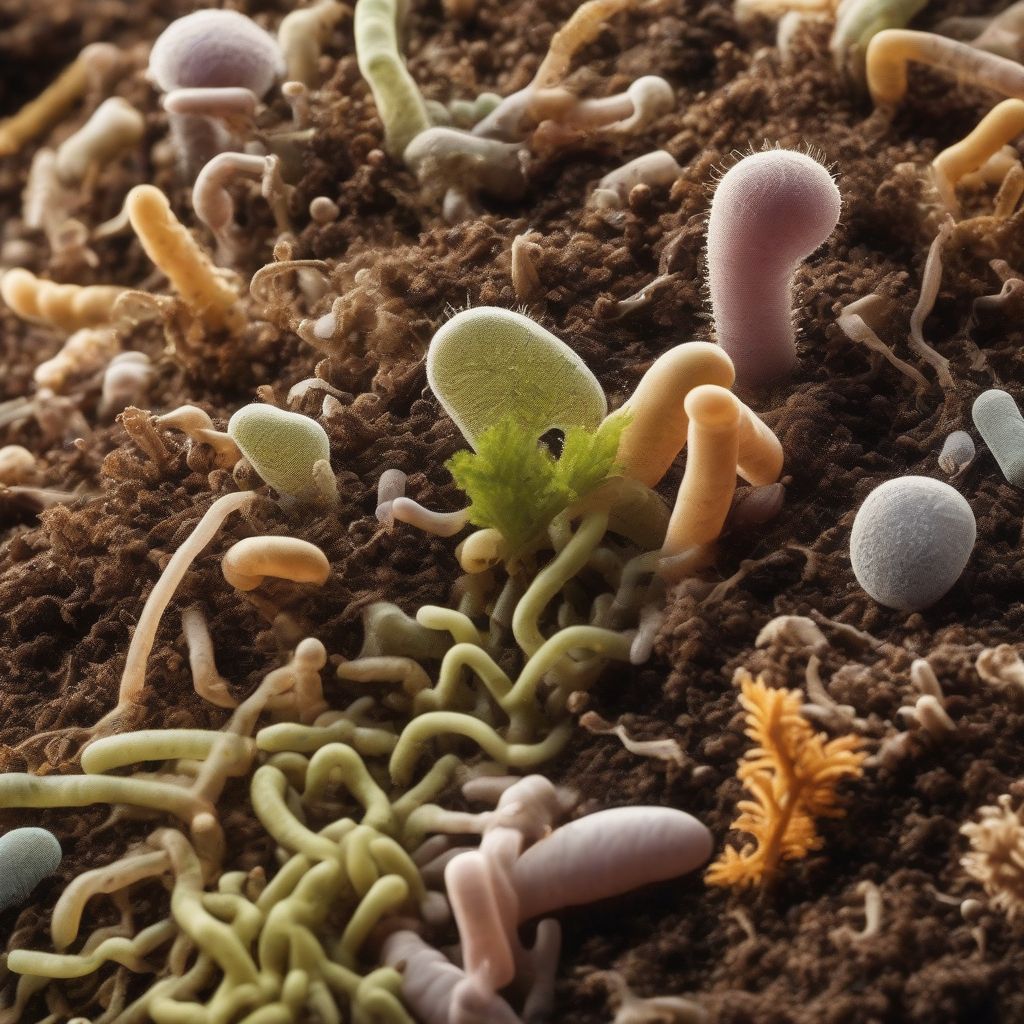Have you ever dreamt of a garden overflowing with vibrant, pest-free produce? What if I told you that the secret to achieving this bountiful dream lies right beneath your feet?
It’s not some magic potion or expensive pesticide, but the often-overlooked foundation of a thriving garden: healthy soil.
Yes, you read that right! Healthy soil is like a superhero cape for your plants, naturally protecting them from pesky invaders.
Understanding the Link Between Soil Health and Pest Control
Think of your garden soil as a bustling city teeming with life. Beneficial bacteria, fungi, and even earthworms work tirelessly, breaking down organic matter, cycling nutrients, and creating an environment where plants can flourish.
This vibrant ecosystem is the hallmark of healthy soil, and it’s this very biodiversity that plays a critical role in natural pest control. Here’s how:
1. Strong Plants, Strong Defenses
Just like a well-nourished body fights off illness better, plants rooted in healthy soil are naturally more resilient to pests and diseases.
Why? Because healthy soil provides a smorgasbord of essential nutrients, enabling plants to build strong cell walls and robust immune systems. This makes it harder for pests to penetrate and feast on your precious plants.
2. An Army of Beneficial Allies
Healthy soil is a haven for beneficial insects and microorganisms that are natural enemies to garden pests. These tiny warriors act as a living pesticide, keeping pest populations in check without the need for harmful chemicals.
Think ladybugs feasting on aphids, parasitic wasps laying eggs in caterpillars, and beneficial nematodes keeping a watchful eye on soil-dwelling pests. They’re the unsung heroes of your garden, and their presence is a direct result of healthy soil.
3. Disease Suppression: Nature’s Own Defense System
Just as a healthy gut microbiome protects us from illness, healthy soil harbors beneficial microbes that suppress disease-causing organisms. These helpful microbes compete with the bad guys for resources, produce antibiotics, and even boost your plants’ immune systems.
This means fewer fungal infections, wilting diseases, and other plant ailments that can attract opportunistic pests.
 Healthy Soil Microorganisms
Healthy Soil Microorganisms
4. Reduced Stress, Increased Resistance
Plants stressed by poor soil conditions, nutrient deficiencies, or inconsistent watering are easy targets for pests. They lack the vitality and defenses to fight back effectively.
Healthy soil, on the other hand, acts as a buffer, providing a stable environment that allows plants to thrive even under challenging conditions. Strong, resilient plants are far less appealing to pests looking for an easy meal.
How to Build Healthy Soil for Natural Pest Control
Now that you understand the crucial link between soil health and pest control, let’s explore how to cultivate this living, protective shield in your own garden:
1. Embrace the Power of Compost
Adding compost to your garden is like giving your soil a potent multivitamin. Compost is teeming with beneficial microbes and essential nutrients that fuel plant growth and improve soil structure.
Make your own compost pile with kitchen scraps and yard waste, or source high-quality compost from a local supplier. Aim to add a layer of compost to your garden beds annually.
2. Mulch: Your Soil’s Best Friend
Mulching isn’t just about aesthetics; it’s a powerful tool for building healthy soil and deterring pests. A layer of organic mulch, like wood chips or straw, helps retain soil moisture, suppresses weeds, and provides a habitat for beneficial insects.
As the mulch breaks down, it adds valuable organic matter to the soil, further enhancing its fertility.
3. Cover Crops: Nature’s Soil Builders
Cover crops, also known as green manure, are a fantastic way to boost soil health during the off-season. These fast-growing plants, like clover or ryegrass, help prevent erosion, suppress weeds, and add valuable nutrients to the soil as they decompose.
Incorporate cover crops into your garden rotation for a natural boost of soil fertility.
4. Minimize Tillage: Let Sleeping Microbes Lie
While tilling might seem like a necessary gardening chore, excessive tillage can disrupt the delicate balance of your soil ecosystem. Tilling can destroy beneficial fungal networks, expose soil organisms to harsh sunlight, and lead to compaction.
Instead of tilling, opt for no-dig gardening methods or minimize tillage whenever possible.
5. Choose Organic Fertilizers: Feed the Soil, Not the Plants
Synthetic fertilizers can harm beneficial soil organisms and disrupt the delicate balance of your soil ecosystem. Opt for organic fertilizers, like compost tea or worm castings, which provide a slow, steady release of nutrients while supporting a thriving soil food web.
6. Rotate Your Crops: Outsmart the Pests
Crop rotation is an age-old practice that helps prevent the buildup of pests and diseases in the soil. By rotating different plant families in your garden beds each year, you disrupt the life cycles of pests that target specific plants.
Reap the Rewards of a Healthy Soil Ecosystem
By prioritizing soil health, you’re not just growing plants; you’re cultivating a thriving ecosystem that naturally protects your garden from pests.
Remember, healthy soil leads to:
-
Stronger, more resilient plants: Plants nourished by healthy soil are better equipped to withstand pest attacks.
-
A diverse army of beneficial insects: A balanced soil ecosystem provides a home for beneficial insects that prey on common garden pests.
-
Suppressed disease outbreaks: Healthy soil harbors beneficial microbes that outcompete disease-causing organisms, protecting your plants from harmful infections.
-
Reduced need for pesticides: When you have healthy soil working for you, the need for chemical interventions drastically reduces.
Embark on Your Soil Health Journey Today!
Building healthy soil is an ongoing journey, but the rewards are well worth the effort. By adopting these sustainable practices, you’ll not only enjoy a more productive and pest-resistant garden but also contribute to a healthier planet.
Start nurturing your soil today, and watch as your garden flourishes with vibrant life and bountiful harvests!
[amazon bestseller=”soil health”]
